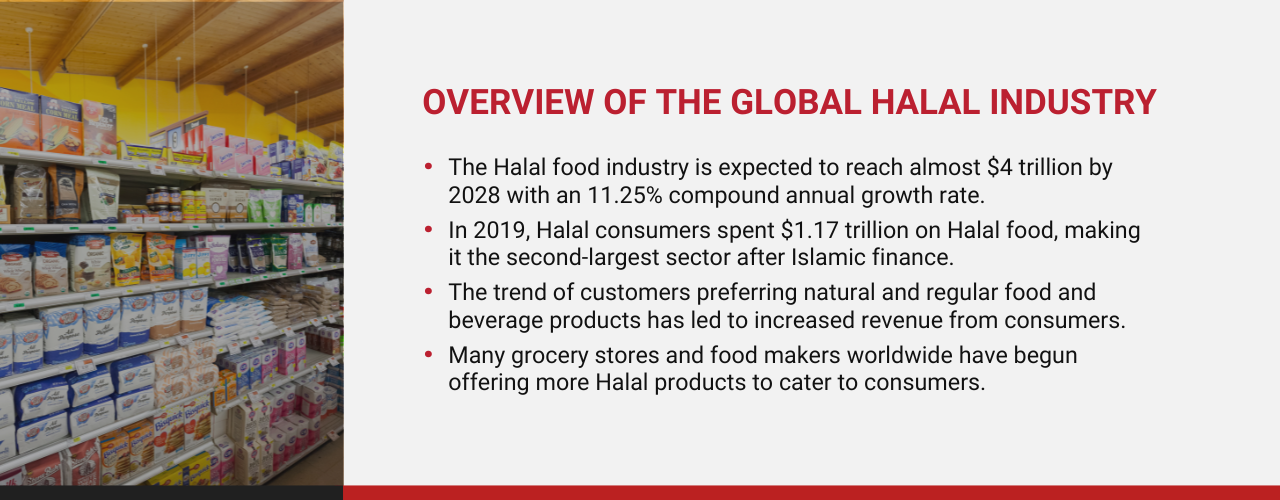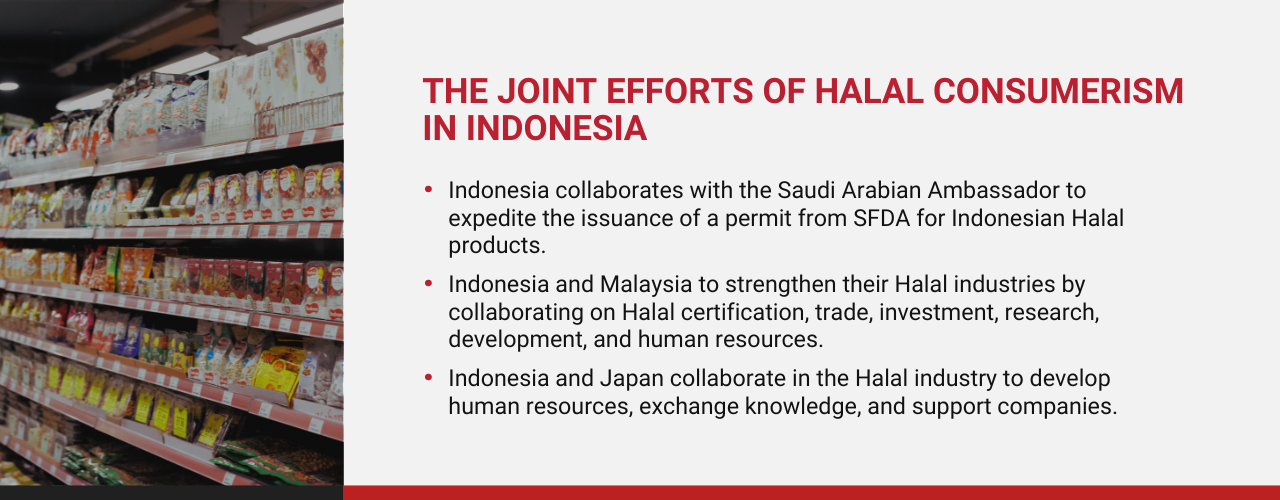The halal industry in Indonesia has witnessed remarkable growth in recent years, primarily driven by the country’s sizeable Muslim population. The demand for halal products and services from Indonesian Muslim citizens continues to increase domestically and globally.
To support the growth of the halal industry, the Indonesian government has prioritized infrastructure investment and the development of regulations to ensure compliance with halal standards.
Global halal industry in 2023

In 2019, consumers spent an astonishing $1.17 trillion on halal food and beverage products. Furthermore, the growing trend of customers opting for natural and halal-certified items has increased revenue for businesses in this sector.
The halal industry in the food and beverage sector is projected to reach nearly $4 trillion by 2028, with an estimated compound annual growth rate of 11.25% over the next eight years.
To take advantage of this forecasted growth, halal food manufacturers can focus on developing new products and expanding their presence in supermarkets, grocery stores, and hypermarkets.
Consequently, several countries have offered a more comprehensive range of halal products to meet customer demands.
Read more: Why Does Food Safety Matter for Indonesian Products?
Halal consumerism in Indonesia
The Indonesian government is actively working to accelerate the development of the national halal industry, aiming to become a leading producer in the global halal market. Indonesia has already become one of the largest consumers of halal products worldwide, accounting for 11.34% of global halal expenditure.
According to the State of the Global Islamic Economy Report 2022, Indonesia ranks fourth in Shariah economy indicators, highlighting its significant presence in the halal food sector (second-largest) and the halal cosmetics sector (fourth-largest). The government encourages Indonesian consumers to use and take pride in locally-made halal products.
One of the largest muslim populations in the world
Indonesia is widely recognized as the country with the highest Muslim majority in Asia, with approximately 88.1% of its population adhering to Islam. It constitutes 12.7% of the world’s Muslim population and continues to grow. The increasing number of Muslim consumers significantly impacts the country’s GDP and consumer behavior.
Muslim consumers are religiously obligated to choose, purchase, and use halal products. Their preferences and purchasing behavior in the halal market significantly influence the Indonesian economy, as they contribute approximately $190.4 billion to the food sector alone.
Moreover, the guarantee of halal products provides the community comfort, security, and certainty of product availability, ultimately adding value to businesses. The use of halal products positively impacts the Indonesian GDP and contributes to the overall progress of the global halal lifestyle and Islamic economy.
Furthermore, businesses actively pursue halal certification commercially, even though the process can be stringent and time-consuming. Companies such as InCorp Indonesia provide F&B product registration and halal certification services, enabling businesses to tap into and benefit from the Indonesian Muslim demographic.
Becoming the world’s halal center
The Badan Penyelenggara Jaminan Produk Halal (BPJPH) recently held a virtual meeting with Dinar Standard and various associations to discuss halal industry development in Indonesia.
During the conference, BPJPH showcased progress in building the halal ecosystem, including digitalizing halal registration and certification processes and improving regulations to ensure halal product guarantees.
According to Dinar Standard’s State of the Global Islamic Economy (SGIE) Report 2022, Indonesia ranks fourth globally in the halal economy. It has made significant progress, particularly in the halal food sector.
With the government’s clear focus on developing the industry, significant growth and progress are expected. Business actors are encouraged to seize the opportunities available in this sector, including international cooperation and government support.
Forecasting the halal industry in Indonesia

Indonesia has made remarkable strides in the halal industry, with promising future prospects. Collaborative efforts with countries like Saudi Arabia, Malaysia, and Japan have been initiated to boost halal consumerism and promote Indonesian halal products globally.
Indonesia and Saudi Arabia collaborate on halal consumerism
Indonesia’s Vice President, Ma’ruf Amin, has sought assistance from the Saudi Arabian Ambassador to Indonesia to facilitate access to halal products.
He requested the Ambassador to expedite the issuance of permits from the Saudi Food and Drug Authority (SFDA) for Indonesian halal products. This collaboration aims to enhance halal consumerism in Indonesia and promote the country’s halal products, particularly in the Middle East region.
Halal consumerism between Indonesia and Malaysia
Indonesia and Malaysia signed a Memorandum of Understanding (MoU) in June 2023 to strengthen the halal industry in both countries. The MoU covers various areas such as halal certification, trade, investment, research and development, and human resource development.
The cooperation aims to promote the development of halal products and services, expanding the halal market domestically and internationally.
Indonesia and Japan mutual plan in halal consumerism
The collaboration between Indonesia and Japan in the halal industry centers around human resource development and support from Japanese companies. Ma’ruf Amin has urged Japanese companies to contribute to the halal sector and support human resource development in Indonesia.
He emphasized that Japan’s technological expertise and innovation could greatly assist in developing Indonesia’s halal industry, which possesses significant growth potential. The collaboration also involves knowledge exchange and technology transfer between the two countries to foster the growth of the halal industry in Indonesia.
Conclusion
In conclusion, the halal industry in Indonesia is experiencing steady growth, thanks to collaborative efforts between the Indonesian government and various countries and organizations.
The progress made in building the halal ecosystem and improving regulations has laid a strong foundation for sustained growth and development in the sector.
With Indonesia’s prominent position in the global halal economy and the government’s unwavering commitment to the sector’s development, businesses have ample opportunities to capitalize on.
As we move forward, we expect to witness further advancements in the halal industry in Indonesia, accompanied by increased international cooperation in this vital sector.
Get in touch with us.
What you'll get
A prompt response to your inquiry
Knowledge for doing business from local experts
Ongoing support for your business
Disclaimer
The information is provided by PT. Cekindo Business International (“InCorp Indonesia/ we”) for general purpose only and we make no representations or warranties of any kind.
We do not act as an authorized government or non-government provider for official documents and services, which is issued by the Government of the Republic of Indonesia or its appointed officials. We do not promote any official government document or services of the Government of the Republic of Indonesia, including but not limited to, business identifiers, health and welfare assistance programs and benefits, unclaimed tax rebate, electronic travel visa and authorization, passports in this website.



